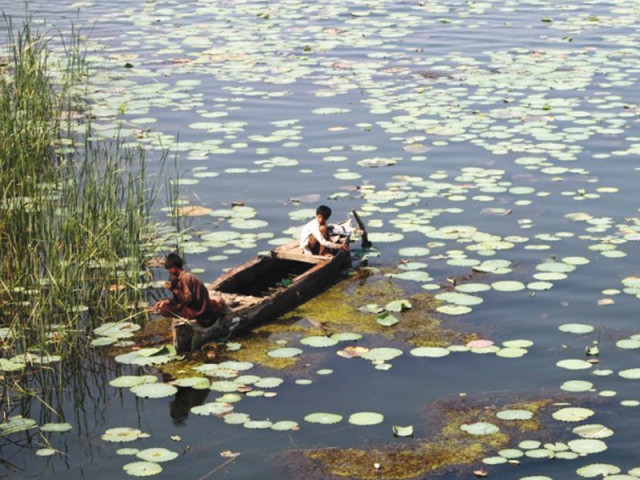Environmental pollution: Keenjhar Lake under threat as effluents keep flowing in
Villagers near the lake complain of skin infections and loss of livestock because of waste.

Residents of the communities settled along Keenjhar complain that the industrial waste of Nooriabad often flows downstream into the lake when the water level rises in the dam. PHOTO: SARAH MUNIR/EXPRESS
“Of the 113 industries, 61 units are currently operational - unfortunately, there is not a single treatment plant to treat the industrial waste,” lamented Abdul Waheed Panhwar, the Communication and Outreach Manager of the Pakistan Relief Foundation.
Residents of the communities settled along Keenjhar complain that the industrial waste of Nooriabad, which has been stored in the Kallu Khuhar Dam near Nooriabad for the past seven years, often flows downstream into Keenjhar when the water level rises in the dam. “The waste has adversely affected our livestock, the underground water as well as the entire ecosystem,” said Faqir Muhammad, 65, a resident of village Faqir Muhammad Palari.
The effluents from the Kotri-based industries are also dumped into the lake through the Kalri Baghar Feeder. The major difference between the two, however, is that while Kotri’s waste flows into the lake throughout the year, Nooriabad’s effluents are facilitated by the yearly torrential gush.
Residents’ woes
Villagers are wary of the toxic waste passing near their villages. Gharib Nawaz Palari, a resident of village Mundar Khan Palari, told The Express Tribune that over 150 of his goats had died over the past two months. “The toxic waste has made our lives miserable. There is so much smell and many of us have contracted skin infections because of it,” he said.
Popular tourist destination
Another major cause of the pollution in the lake is the waste dumped by tourists and visitors to the site. “Almost 17,000 people visit the lake weekly, mostly from Karachi,” revealed the national programme manager at the United Nations Development Programme’s small grants programme, Masood Ahmed Lohar. “The lake is a major recreational site for people from Karachi but it lacks proper management,” lamented Lohar.
Who is responsible?
The Keenjhar Lake also serves as a wildlife sanctuary but the provincial government’s department has no grip over it. “There are number of stakeholders, including the fisheries, the irrigation department and the Karachi Water and Sewerage Board,” informed a top official of Sindh Wildlife department.
On condition of anonymity, the official told The Express Tribune that political interference was another major issue. “The department was not even taken into confidence when the plan of eco-tourism was being implemented,” he said, adding that illegal fishing, dumping of waste materials, Typha cutting and hunting of migratory birds were major sources of pollution.
The executive director for the Centre for Environment and Development, Nasir Panhwar, also believes that more than one stakeholder was responsible for the lake’s critical condition. “Everyone stands up for their share in the revenue but when the question of investment arises, not a single party appears,” Panhwar alleged. He feared that the Keenjhar Lake’s status as a Ramsar site could be taken back if serious efforts for its rehabilitation were not taken.
In his opinion, it is the mandate of the forest and wildlife department to maintain the lake. The Sindh Environment Protection Agency, meanwhile, is responsible to stop the flow of industrial waste into the lake, he said.
On Sunday, the Pakistan Relief Foundation President Haleem Adil Sheikh again raised the issue of contamination and said that he will file two separate petitions in the Sindh High Court, seeking action against the continuous contamination of water resources in Jamshoro and Karachi. Shaikh, speaking at a press conference in Hyderabad said, “I will file a petition in the SHC Karachi against the supply of contaminated water to the citizens and another petition in the SHC, Hyderabad bench, about the pollution in Keenjhar Lake.”
Published in The Express Tribune, September 23rd, 2013.



















COMMENTS
Comments are moderated and generally will be posted if they are on-topic and not abusive.
For more information, please see our Comments FAQ